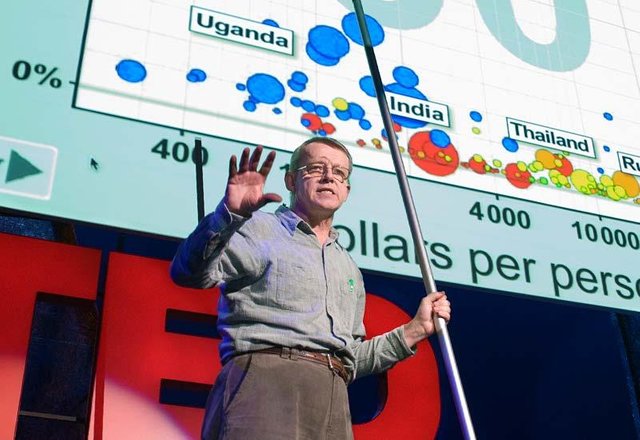My favourite TED talks (Part Fourteen)
I have been passionately promoting TED almost since it started. It is a fantastic initiation that completely re-shaped public speaking and informative presentations by creating a very entertaining and unique formula for sharing information. In today's accelerated world it offers us full engagement in any contemporary subject in maximum 20 minutes. Speakers are carefully selected and well-prepared to meet the high standards, therefore it is a real privilege to give a TED-talk. There are thousands of great speeches in basically any topic that you could imagine, so it is not easy to choose the best ones. Still, in this series I would like to share with you a few personal favourites.
Hans Rosling is one of my favourite TED speakers and probably he is one of the most featured ones, too. It is absolutely no question why... he has a stunningly entertaining style. He can present complex data in a way, no one else did before him. His enthusiastic style pushes his message right into our face. Unfortunately, he has died a few years ago, so this post is a tribute to his wonderful talks:
- The best stats you have ever seen is an awesome presentation about the so-called developing world, which (as he pointed out) is no longer worlds away from the West. In fact, most of the Third World is on the same trajectory toward health and prosperity, and many countries are moving twice as fast as the west did.
- New insights on poverty is also an amazing talk. He uses his cool data tools to show how countries are pulling themselves out of poverty.
- Insights on HIV, in stunning data visuals unveils data visuals that untangle the complex risk factors of one of the world's deadliest (and most misunderstood) diseases: HIV. By following the data, he suggests a surprising key to ending the epidemic.
- Let my data set change your mindset is the 500th TED talk. In this he uses his fascinating data-bubble software to burst myths about the developing world. Look for new analysis on China and the post-bailout world, mixed with classic data shows.
- In Asia's rise - how and when he graphs global economic growth since 1858 and predicts the exact date that India and China will outstrip the US.
- Global population growth, box by box is showing a colourful new data display technology. The world's population will grow to 9 billion over the next 50 years -- and only by raising the living standards of the poorest can we check population growth. This is the paradoxical answer that Hans Rosling unveils in this wonderful talk.
- The good news of the decade reframes 10 years of UN data with his spectacular visuals, lighting up an astonishing -- and under-reported -- piece of front-page good news: We're winning the war against child death. Along the way, he debunks one flawed approach to stats that blots out such vital stories.
- The magic washing machine is asking the question of what was the greatest invention of the industrial revolution? Hans Rosling makes the case for the washing machine. With newly designed graphics from Gapminder, Rosling shows us the magic that pops up when economic growth and electricity turn a boring wash day into an intellectual day of reading.
- Religions and babies is asking if some religions have a higher birth rate than others -- and how does this affect global population growth? He graphs data over time and across religions. With his trademark humour and sharp insight, Hans reaches a surprising conclusion on world fertility rates.
- How not to be ignorant about the world also presents his famous charts of the global population, health and income data (and an extra-extra-long pointer). He demonstrates that you have a high statistical chance of being quite wrong about what you think you know. Play along with his audience quiz — then, from Hans’ son Ola, learn 4 ways to quickly get less ignorant.
Do you have a favourite TED-talk? I would be interested to know. We can learn from each other... 😊 Stay tuned, soon I come back with another suggestion for you.
Previous parts of this series:
Simon Sinek on leadership
Ursus Wehrli on tidying up arts
Dan Ariely on the irrationality of our "rational" decisions
Julian Treasure on listening
Tim Urban on procrastination
Nicolas Christakis on social networks
Amy Cuddy on the power of body language
Dan Pink on motivation
Kelly McGonigal on stress management
Shawn Anchor on happiness at work
Ron Gutman on smiling
Celeste Headlee on good conversations
Michael Shermer on myths, superstitions and urban legends

Congratulations @ksolymosi! You have completed the following achievement on the Steem blockchain and have been rewarded with new badge(s) :
Click here to view your Board
If you no longer want to receive notifications, reply to this comment with the word
STOPTo support your work, I also upvoted your post!
Vote for @Steemitboard as a witness and get one more award and increased upvotes!